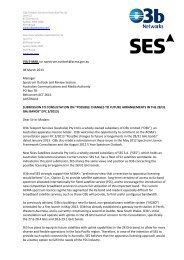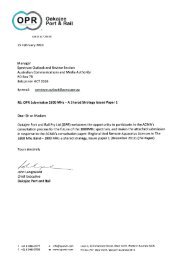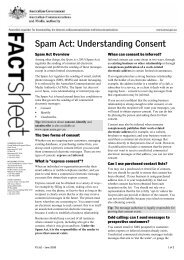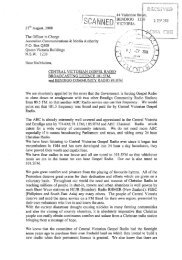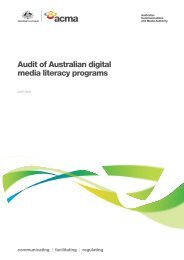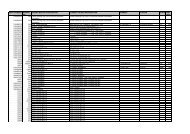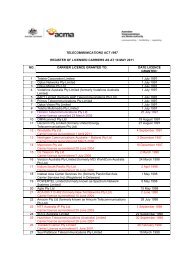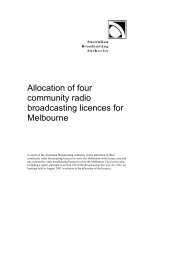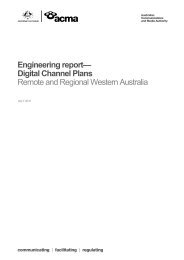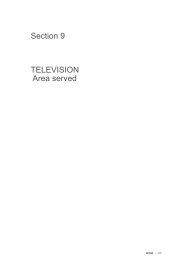Hearing aids And Mobile phones - ACMA
Hearing aids And Mobile phones - ACMA
Hearing aids And Mobile phones - ACMA
You also want an ePaper? Increase the reach of your titles
YUMPU automatically turns print PDFs into web optimized ePapers that Google loves.
CANBERRA CENTRAL<br />
Purple Building Benjamin Offices<br />
Chan Street<br />
Belconnen ACT 2617<br />
PO Box 78<br />
Belconnen ACT 2616<br />
T: 02 6219 5555<br />
F: 02 6219 5200<br />
MELBOURNE CENTRAL<br />
Level 44, Melbourne Central Tower<br />
360 Elizabeth Street<br />
Melbourne VIC 3000<br />
PO Box 13112 Law Courts<br />
Melbourne VIC 8010<br />
T: 03 9963 6800<br />
F: 03 9963 6899<br />
SYDNEY CENTRAL<br />
Level 15, Tower 1 Darling Park<br />
201 Sussex Street<br />
Sydney NSW 2000<br />
PO Box Q500<br />
Queen Victoria Building NSW 1230<br />
T: 02 9334 7700<br />
F: 02 9334 7799<br />
<strong>Hearing</strong> <strong>aids</strong> and mobile <strong>phones</strong><br />
<strong>Mobile</strong> <strong>phones</strong> are a convenient means of<br />
communication and their use is rapidly increasing.<br />
People with a hearing device may experience an<br />
interfering noise when using a mobile phone or when<br />
one is used nearby.<br />
This fact sheet contains information for mobile phone<br />
users who wear a hearing device.<br />
What causes the interference?<br />
The interference is caused by the radio signals<br />
generated by the mobile phone. It can be a buzzing<br />
sound that makes speech hard to understand. In severe<br />
cases, it can make the phone unusable.<br />
How much you are affected by interference from a<br />
mobile phone depends on:<br />
• the type of mobile phone—GSM (global system<br />
for mobiles) or CDMA (code division multiple<br />
access);<br />
• your hearing device;<br />
• the distance between the hearing device and the<br />
mobile phone; and<br />
• your personal tolerance to noise.<br />
The difference between GSM and CDMA<br />
The GSM mobile phone service is the one most<br />
commonly used in Australia. The CDMA service<br />
replaced the analog service when it closed down.<br />
The degree of interference to hearing devices is likely<br />
to be greater when a GSM mobile phone is used.<br />
CDMA mobile phone technology is more suitable for<br />
use with most hearing <strong>aids</strong>. However, you should be<br />
aware that CDMA <strong>phones</strong> may also cause interference<br />
in some situations.<br />
Are there situations where interference is<br />
better or worse?<br />
Interference is worse where mobile reception is poor.<br />
Make sure there is good coverage from the network<br />
you choose in the area where you will use your<br />
mobile phone the most.<br />
What about accessories?<br />
If you choose a GSM mobile phone, accessories such<br />
as a hands-free kit may reduce interference. Some<br />
hands-free accessories are designed to be worn behind<br />
the ear.<br />
Different accessories will suit different hearing <strong>aids</strong><br />
so check that your hearing device is compatible with<br />
the mobile phone you choose.<br />
Will this problem be solved?<br />
The situation is improving and newer <strong>phones</strong> cause<br />
fewer problems. New hearing <strong>aids</strong> may also have<br />
higher levels of immunity and so cause less<br />
interference.<br />
Before you buy a mobile phone, consider:<br />
• whether connecting to the CDMA network would<br />
suit you—most people with a hearing device<br />
experience less interference with a CDMA<br />
phone;<br />
• that the interference will be worse where<br />
reception is poor;<br />
• the type of mobile handset you want to purchase;<br />
• whether the type of hearing aid you use has a Tswitch—a<br />
T-switch might make accessories work<br />
better but can increase interference from features,<br />
for example, signals from the handset display;<br />
• that if you use only one hearing aid, you may be<br />
able to get satisfactory results by using the phone<br />
with the ear that doesn't have the hearing aid;<br />
• how close the antenna is to your ear-it is better to<br />
have the antenna as far from your ear as possible,<br />
so look for a phone that increases the distance<br />
between the phone's antenna and your hearing<br />
aid;<br />
• buying accessories that increase the distance<br />
between the phone and your hearing aid, such as<br />
hands-free attachments and inductive loops;<br />
• the compatibility of the phone you prefer with the<br />
accessories you want to use;having a hands-free<br />
car kit installed if you are going to use the phone<br />
in a vehicle;<br />
• asking people who use mobile <strong>phones</strong> and have<br />
hearing <strong>aids</strong> about their experience and what they<br />
recommend;<br />
• shopping around for a mobile phone provider or<br />
outlet who can advise you on the mobile phone<br />
and accessories that are most suitable for you;<br />
• trying the phone before you buy it, at least in the<br />
shop and preferably by borrowing one of a<br />
similar model so you can use it away from the<br />
FS 49 – June 2008 1 of 2
shop—if possible, test the phone in the areas<br />
where you will be using it most often and in a<br />
various situations;<br />
• testing the handset you want to purchase for<br />
volume level, speech clarity and the level of<br />
interference;<br />
• going to different shops until you find one where<br />
the people understand about hearing <strong>aids</strong> and<br />
interference and are willing to help you resolve<br />
it—don't accept assurances without testing the<br />
handset for yourself;<br />
• whether the shop stocks accessories that you can<br />
try; and<br />
• if you know which network you are going to use,<br />
ringing the customer assistance area of the<br />
network to ask about store where you can try the<br />
<strong>phones</strong> before you buy—not every shop will have<br />
the expertise and equipment to be able to help<br />
you.<br />
More information<br />
More information on mobile <strong>phones</strong> is available on<br />
<strong>ACMA</strong>’s website, at Hwww.acma.gov.au (go to For the<br />
public > Consumer and community advice ><br />
Choosing products and services).<br />
Please note: this document is intended as a guide only and should<br />
not be relied on as legal advice or regarded as a substitute for legal<br />
advice in individual cases.<br />
FS 49 – June 2008 2 of 2



